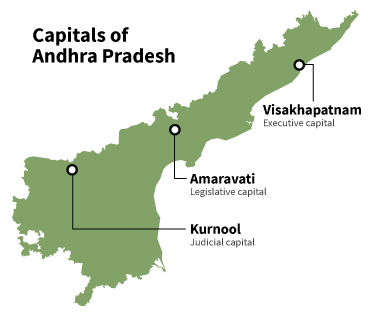
AP's three-capital quagmire holds too many challenges for state govt.
The Jagan Mohan Reddy government’s decision to shift the capital of Andhra Pradesh to the coastal city of Visakhapatnam is essentially a political decision aimed at erasing the legacy of former Chief Minister N. Chandrababu Naidu, who had conceived Amaravati as an ultramodern Greenfield capital city that ‘India has never seen before.’

The Jagan Mohan Reddy government’s decision to shift the capital of Andhra Pradesh to the coastal city of Visakhapatnam is essentially a political decision aimed at erasing the legacy of former Chief Minister N. Chandrababu Naidu, who had conceived Amaravati as an ultramodern Greenfield capital city that ‘India has never seen before.’
The move raises more questions than it seeks to answer and poses several challenges to the YSR Congress Party (YSRCP) government as it grapples with the growing public perception that its policy decisions are driven more by a sense of political vindictiveness than by any long-term vision.
Investors wary
Already, the reversal of key policy decisions on myriad projects has created a negative image, scaring away several potential investors at a time when the state is still reeling under post-bifurcation blues and is in desperate need of investments.

The big Amaravati dream finally ended on Monday (January 20) with the YSRCP government introducing two bills in the special session of the state assembly — one to repeal the AP Capital Region Development Authority (APCRDA) that had paved the way for building the capital at Amaravati and another to ensure ‘decentralized administration for balanced development of all regions.’ The two bills respectively are the AP Capital Region Development Authority (APCRDA) Repeal Bill 2020 and the AP Decentralisation and Inclusive Development of All Regions Bill 2020.
The latter bill aims at the formation of three capitals with Visakhapatnam, Amaravati, and Kurnool, as the executive, legislative, and judicial capitals respectively.
This effectively means shifting the capital from Amaravati to Visakhapatnam. The passage of the twin bills during the three-day special session (which started on January 20) is a mere formality as the YSRCP has an overwhelming majority in the House, accounting for 151 seats in the 175-member assembly.
Also read: Amaravati fallout: Pawan Kalyan ties up with BJP, TDP could be next in line
Challenges ahead
A plethora of challenges lie ahead as the government is trying hard to justify its ‘three-capital’ idea on the ground that it would lead to decentralisation of administration and equitable development of all the regions.
Foremost among them is the fate of farmers of Amaravati region who had voluntarily given over 33,000 acres of fertile land, under land pooling scheme, for building the new capital. The farmers of 29 villages in Guntur district have been staging protests for over a month now, harping on the ‘One State-One Capital’ slogan. Opposition parties have thrown their weight behind the agitation.
Uncertainty looms over the land pooling agreements that the previous government had reached with the farmers. Working out a compensation package for the affected farmers would be a humungous task for the new government.
Also read: Politics over Amaravati: New alibis, bizarre reasons for shifting the capital
Though the APCRDA would be repealed, the agreements with the farmers would still be valid and the government is obliged to provide compensation for them under the Land Acquisition Act of 2013.
Apart from financial implications of the compensation package, the more daunting task is to handle the adverse impact the shifting of the capital would have on the livelihood of farmers.
Even if the government returned their lands, the farmers would not be able to use it for cultivation. “Since structures have come up in the capital region, the fertility level of the lands cannot be restored. When there is no capital city, what will farmers do with the developed plots given to them under the land pooling agreement?” says K. Nageswar, a political analyst.
Another question is on compensating private organisations which had purchased land on market value in the hope of reaping benefits from the new capital city.
Logistical nightmare
The idea of having three capital cities, which are located nearly 400 km apart, will throw up a plethora of administrative, economic, and logistical challenges, though the objective of the government appears to be to keep people of all the three regions happy.
While the port city of Visakhapatnam, the largest in the state, is located in the north coastal region, closer to Odisha, Kurnool is in the backward Rayalaseema region and Amaravati in the prosperous south coastal belt in the Vijayawada-Guntur region. Visakhapatnam and Kurnool are nearly 700 km apart.
Urban planning experts have also questioned the rationale behind a relatively smaller state like AP going for three capital cities. It could lead to a lot of administrative issues as well. Everytime there is an assembly session, the entire administration will have to move to Amaravati. Similarly, officials will have to make rounds to Kurnool to attend to court cases.
Also read: Stir over Amaravati: TDP chief, other leaders held in Vijayawada
Getting a high court complex in Kurnool would not, in any way, bring about any development to the backward Rayalaseema region.
Amaravati will now end up hosting two or three assembly sessions every year while the entire focus will shift to Visakhapatnam, the seat of the administration.
One of the arguments made by the government in defence of the decentralised seats of administration is that over-concentration of resources in one particular city would create regional imbalances, as was the case with Hyderabad in the combined Andhra Pradesh.
However, there is no explanation for choosing Visakhapatnam as executive capital as it was already the second largest city in the combined AP, after Hyderabad, in terms of gross district domestic product.
Insider trading
The ruling YSRCP leaders have repeatedly alleged that there was ‘insider trading’ in Amaravati when the TDP leaders had purchased large tracts of land at cheaper rates in 2014 before the announcement of the new capital by the Chandrababu Naidu government.
The questions being asked are: why the people of a region are being punished for the misdeeds of a few leaders and what stopped the YSRCP government from probing alleged irregularities.
‘Vulnerable region’
One of the reasons cited by the government to abandon Amaravati was the ‘vulnerability’ of the region to flooding.
This is strange because the National Green Tribunal (NGT) had examined the issue in great detail before granting clearance for the project in November 2017.
Also read: It’s official, end of Amaravati dream for Andhra Pradesh
“It is clear from the Environment Impact Assessment (EIA) report that the capital city area does not fall in a flood plain. There was no flooding in the area falling within the proposed capital city,” the NGT had said in its verdict.
“Although the applicants (petitioners) have alleged that the capital city is prone to flooding from the river Krishna on the basis of certain documents, the fact is that the areas mentioned in these documents do not fall within the proposed capital city’s boundary. The reference to Guntur made in these documents is with regard to the district as a whole and not to any particular area falling within the proposed capital city. Apart from it, there is no flooding in the capital city area from river Krishna because of the existing embankments/bunds. Therefore, the proposed city is not located within the flood plain,” the order said.
Real estate battle
The row over capital city location is largely seen as a real estate battle between the two influential communities — Kamma and Reddy — owing allegiance to the TDP and the YSRCP respectively.
If TDP leaders were at the centre of ‘insider trading’ allegations surrounding Amaravati project, it is now the turn of the YSRCP leaders to face similar charges in Visakhapatnam.
In a state where politics is largely driven by caste dynamics, the choice of Amaravati in Vijayawada-Guntur region as the new capital was seen as a ‘gift’ to Kammas, a dominant community in the region to which Naidu belongs. The politically influential Reddy community, which Jagan hails from, is mostly concentrated in the backward Rayalaseema region where there has been growing public resentment and a sense of neglect.


